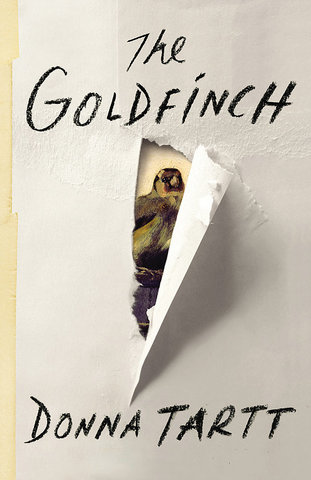 Written by Lauryn Smith I have been eager to get my hands on Donna Tartt’s third novel, “The Goldfinch,” for quite some time, and recently something fantastic happened. Reviewer Beth Winters surprised me with a copy on my birthday! I breezed through the book, and Miss Tartt, I would be honored to shake your hand. You might be familiar with Tartt’s second novel, “The Secret History.” That book was published in 1992. “The Goldfinch” was published in 2013. Tartt clearly takes her time, but it is well worth the wait. “The Goldfinch” is more than a story. It is a work of art. The novel depicts the fictional life and times of Theodore (Theo) Decker. One day when Theo is 13 years old, he and his mother visit a New York art museum. There Theo's mother dies in an unfathomable explosion. During the scramble of events following the outburst, Theo encounters a dying man who ultimately has a profound effect on his life. The key element: a painting by Carel Fibritius called The Goldfinch, a painting the man implores Theo to take out of the crumbling museum. Tartt transforms what could have easily been a common tale involving broken families, child services, addiction and wealth disparities into a tantalizing story that also involves stolen art, the act of coming of age and philosophical musings. Told from Theo’s perspective, the narrative is semi-chronological. Theo is clearly reflective and intelligent though often unchallenged and disinterested. After the incident at the museum, he finds himself moved from place to place, passed from person to person. His estranged father struggles with gambling and alcohol, and he feels isolated from most of his peers. He longs for his deceased mother. The only thing that keeps him grounded is his secret—the valuable painting of a chained golden bird, which he keeps hidden from everyone, including the police looking to recover art that went missing in the aftermath of the explosion.
Although the story takes place in the early 21st century, it has an old-school vibe and classic feel. “The Goldfinch” is one of those books that you can return to over and over again and each time find something new to appreciate. Tartt's detailing is unreal. Not only do her words result in vivid imagery, they mirror the moods that constitute the story. This style is best exemplified in the varied scenes of chaos, such as booze-filled nights, a particular altercation resulting from underground art dealings and, of course, the museum explosion. The notions Tartt presents are as intriguing as her style. Through the protagonist’s contemplations, Tartt rewards readers in the novel's final pages with an argument on what life is and is not, what it means and does not mean. Though you will undoubtedly grow fond of the story's characters, do not expect the “where are they now” type of ending. We get some of those details slightly prior to and amidst the denouement, but Tartt seizes the opportunity to get readers to ruminate, to prompt a consciousness of what some consider to be uncomfortable philosophies. I highly recommend taking a minute to reflect on the content of “The Goldfinch” as it will mediate a deeper understanding of what it means to live. Tartt’s creativity might be the most remarkable facet of the book. The plot is unparalleled. There are countless ways in which the story's themes could have been artlessly exaggerated. The concept of love, for instance, is included tastefully and with purpose rather than as a “sex sells” marketing tactic. This is Tartt, after all. Her prose is distinctive and entertainingly comprehensive. There are no holes in the storyline. The plot is rational. The pace is superb. And the characterization. Holy. Cow. I think I may have a new favorite fictional character. His name? Boris Pavlikovsky. Boris is Theo’s broody, street-smart, worldly Ukrainian friend who lives moment-to-moment and speaks with good-natured humor and realism. Tartt expertly balances his traits, and she does the same for the host of other characters populating the novel. Each is clearly defined and given a distinct personality. The characters are complicated, their language on point. They are memorable, a characteristic that takes genuine skill to accomplish. Even better, Tartt broaches tangibles that are surely outside the realm of general knowledge, such as antique furniture restoration. At the same time, she tackles intangibles, like survival, addiction, loss, beauty and obsession. But with both, she writes with tact and grace, seamlessly guiding readers through a story that is deep and full of meaning. I would be remiss if I did not mention that “The Goldfinch” has received a handful of poor reviews. The reason for those poor reviews? Most often, wordiness. I am puzzled by those who say Tartt uses words excessively or that she disguises flaws with exorbitant detail. Perhaps those people want nothing more than a page-turner, a beach read. “The Goldfinch” simply takes time and concentration to be fully appreciated. The book is worth sticking with—it has a lot to offer. It is almost impossible to write a succinct review that is both enlightening and void of spoilers. “The Goldfinch” is multifaceted, and it covers a lot of ground. Like I said earlier, the book is a work of art. It will appeal to many audiences. Tartt’s writing is effortless, and the novel is absorbing and thought-provoking. It is powerful yet calm. Some, such as Stephen King, call it Dickensian. Like a Dickens novel, “The Goldfinch” is a book worth spending time with. Title: The Goldfinch Author: Donna Tartt Publisher: Little, Brown and Company Original publication date: September 23, 2013 Page count: 784 List price: $30 ISBN: 978-0316055437 Awards: 2014 Pulitzer Prize for Fiction; 2014 Andrew Carnegie Medal for Fiction; 2014 Audie Award for Literary Fiction Nominations: 2013 Goodreads Choice Award Nominee for Fiction; 2013 National Book Critics Circle Award Nominee for Fiction; 2014 Baileys Women’s Prize for Fiction Nominee
0 Comments
Your comment will be posted after it is approved.
Leave a Reply. |

Enjoying my book reviews? If you’ve found them helpful or simply love diving into a good book, consider supporting my caffeine-fueled reading sessions! Your contribution helps keep the reviews coming and ensures I stay wide awake for those late-night reading marathons. Cheers to a shared love for literature! ☕️
Categories
All
|
